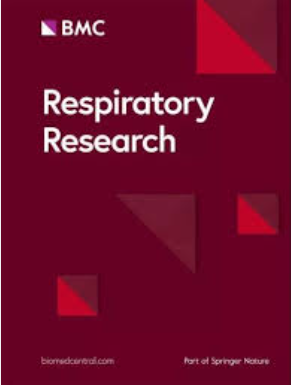阿托伐他汀降低严重危重 COVID-19 患者 28 天死亡率:随机对照试验
IF 4.7
2区 医学
Q1 RESPIRATORY SYSTEM
引用次数: 0
摘要
COVID-19 是宿主对 SARS-CoV-2 感染的一种异常反应,与内皮功能障碍和多器官功能衰竭有关。阿托伐他汀被认为可以减轻 COVID-19 的严重程度,并降低慢性和新发使用者的死亡率。这项随机双盲试验包括埃及曼苏尔大学隔离医院收治的 220 名 COVID-19 患者。110名患者接受了为期28天、每天一次、每次40毫克阿托伐他汀的治疗(A组),110名患者接受了安慰剂治疗(B组)。所有患者均按照医院规定接受治疗。主要结果是 28 天内的全因死亡率。我们还跟踪了 6 个月的死亡率、临床改善时间、有创机械通气风险、急性肾损伤、潜在不良事件以及住院时间和重症监护时间。A 组的 28 天全因死亡率为 52/104 例(50%),B 组为 54/103 例(52.4%),比值比 (OR) = 0.907 (0.526, 1.565),P = 0.727;调整后 OR = 0.773 (0.407, 1.47),P = 0.433。A 组与 B 组的六个月死亡率分别为 53/102(52%)和 59/79(60.8%),P = 0.208。在 A 组与 B 组的住院幸存者中,临床改善的中位时间分别为 10 天(7-14)与 10 天(7-15),P = 0.715;住院时间分别为 10 天(7-14)与 10 天(8-17),P = 0.378。B 组患者的停药率较高(4 对 1),但在统计学上并不显著,P = 0.369。在患有严重或危重COVID-19的成人患者中,阿托伐他汀并不能降低28天或6个月的死亡风险,也不能缩短住院时间或临床改善时间。试验注册 临床试验注册中心(NCT04952350)于 2021 年 7 月 1 日注册。https://clinicaltrials.gov/ct2/show/NCT04952350本文章由计算机程序翻译,如有差异,请以英文原文为准。
Atorvastatin for reduction of 28-day mortality in severe and critical COVID-19 patients: a randomized controlled trial
COVID-19 is an abnormal host response to the SARS-CoV-2 infection, which is associated with endothelial dysfunction and multi-organ failure. Atorvastatin has been proposed to reduce COVID-19 severity and mortality in chronic and de-novo users. This randomized double-blind trial included 220 COVID-19 patients admitted to Mansoura University's isolation hospital in Egypt. One hundred and ten cases were given 40 mg of atorvastatin once daily for 28 days (group A), while 110 received a placebo (group B). All patients received treatment as per hospital protocol. The primary outcome is all-cause mortality at 28 days. We also tracked 6-month mortality, time to clinical improvement, the risk of invasive mechanical ventilation, acute kidney injury, potential adverse events, and hospital and intensive care length of stay. The 28-day all-cause mortality was 52/104 (50%) in group A vs. 54/103 (52.4%) in group B, odds ratio (OR) = 0.907 (0.526, 1.565), P = 0.727; adjusted OR = 0.773 (0.407, 1.47), P = 0.433. Six-month mortality occurred in 53/102 (52%) and 59/79 (60.8%) in group A vs. B, respectively, P = 0.208. Among hospital survivors in group A vs. group B, the median time to clinical improvement was 10 days (7–14) vs. 10 (7–15), P = 0.715; the duration of hospital stay was 10 days (7–14) vs. 10 (8–17), P = 0.378. Discontinuation was higher in group B (four vs. one), but statistically insignificant, P = 0.369. In adults with severe or critical COVID-19, atorvastatin did not reduce the risk of 28-day or 6-month mortality and did not shorten the length of hospital stay or time to clinical improvement. Trial registration Clinical Trial Registry (NCT04952350) on July 1st, 2021. https://clinicaltrials.gov/ct2/show/NCT04952350
求助全文
通过发布文献求助,成功后即可免费获取论文全文。
去求助
来源期刊

Respiratory Research
医学-呼吸系统
自引率
1.70%
发文量
314
期刊介绍:
Respiratory Research publishes high-quality clinical and basic research, review and commentary articles on all aspects of respiratory medicine and related diseases.
As the leading fully open access journal in the field, Respiratory Research provides an essential resource for pulmonologists, allergists, immunologists and other physicians, researchers, healthcare workers and medical students with worldwide dissemination of articles resulting in high visibility and generating international discussion.
Topics of specific interest include asthma, chronic obstructive pulmonary disease, cystic fibrosis, genetics, infectious diseases, interstitial lung diseases, lung development, lung tumors, occupational and environmental factors, pulmonary circulation, pulmonary pharmacology and therapeutics, respiratory immunology, respiratory physiology, and sleep-related respiratory problems.
 求助内容:
求助内容: 应助结果提醒方式:
应助结果提醒方式:


